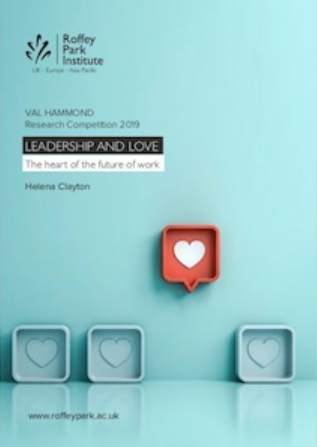Leadership consultant, coach and advocate for leading with love

Helena Clayton is no ordinary consultant. As an advocate for love in leadership, her take on professional development is rooted in self-love and how we care for others at work.
Originally from South Wales, Helena began her career in HR, before moving into leadership and organisational development consulting and now runs her own consultancy. Her clients are in all sectors and she also works as an Associate with Roffey Park and London Business School.
Love. A word that has the power to make us glow on the inside and out, but that can also set our teeth on edge. Especially if we think about love at work. But why is this? Something so fundamentally human, so powerful. Yet we put it in a box – out of sight – for hours a day, days a week, weeks a year, whilst we’re ‘at work’.
I ask Helena what love means in the context of work, and how we might begin to unlock more of it in ourselves and for each other.
Louise What sparked your interest in love and leadership?
Why is love not more visible in organisations? How could love influence organisational cultures for the better?”
Helena I have a deep interest in the world of work, and alongside my career, through my personal growth work over many years, I’ve seen time and again that when someone is struggling or has difficulty, stress, anxiety – whatever it is – that when it was met with love, healing took place. Not that it was healed, but that there was healing. In my professional work, I was seeing sterile, arid, unkind, thoughtless even harsh workplaces. But alongside this, I was seeing that love was a vital ingredient. I began to ask why is love not more visible in organisations? How could love influence organisational cultures for the better? Why is it so forbidden? Why don’t we talk about it, and why is it so taboo? What would happen if we started to talk about it more?
These questions are what got me really interested in the idea that love could make a big difference to people’s lives at work.
Louise You’ve begun a fascinating piece of research on love in leadership but you consciously don’t provide a definition of what ‘love’ is. Do you have a sense of what it looks and feels like?
Helena I intentionally avoided a definition as it can close off lots of possibilities, but what the research showed categorically is that love at its heart was about care. This was where people reached towards and I think that’s entirely right: care, compassion, empathy, nurture. But as I research and think more about it, there are a couple of other important elements too. One is radical acceptance. Like, ‘how can I say yes to pretty much anything that somebody brings to me?’. So it’s not just accepting who they are but really when somebody’s being “difficult” asking ourselves ‘how can I still welcome this in?’.
Behind every obnoxious act is a human being“
Deeya Khan
To borrow a quote from the film director Deeya Khan, she says ‘behind every obnoxious act is a human being’. It’s a radical idea because when the going gets tough it can take a lot of work to really see the human being within it all.
The other key thing I think is that love also brings in anger. If you’re a leader, it’s part of your job to take a stand for something and to hold a really clear boundary around it. Maybe it’s to say no or to fight for something, but we have to know what matters to us, and we have to know what really gets us angry, what is not okay in the world. When you’re angry, it helps show you what you stand for, so you can take more of an activist role. For leaders, care, acceptance and anger are all part of love.
Louise What’s your ultimate hope for more love in leadership?
Helena It’s absolutely about having a more deeply human workplace. It’s about how we can help people feel safe and accepted for who they are (following on the ideas of Amy Edmondson and psychological safety). That’s really at the heart of it, when where we work can be a place of fulfilment, meaning and purpose, more than it is now.
When I asked participants in my research a similar question, the first thing that emerged was people said, ‘I would be a better version of me’, that they’d shine more brightly, which is beautiful. Secondly, people said that there would be less competition and more collaboration, which is absolutely what we know we need in the world. Thirdly, people said that if I’m not using all my energy to make myself feel safe – because more love would help me feel safe – then I could use that energy to be more creative, innovative and problem solving. There would be a greater chance that we could actually work together to solve really difficult problems. So it’s not just a sense of ‘it would feel nicer around here’. People saw really clearly there would be links to not just business performance but to social change.
Louise If people see the benefits of love at work, why do you think we have barriers to this?
Love is the most awful invasion of privacy“
Kenneth Williams
Helena So in our lives outside work there’s a sense that love is okay, it’s expected to be there even if many of us don’t talk about it. But at work it’s not really present or permitted. I think there are several reasons, and one of which is that we assume it doesn’t belong: it’s not a core competency. There’s also a rule of the road that says in organisations ‘you do not have access to the real me, you are not allowed to have access to my inner worlds’. Something like ‘I give you my hands and I give you so many hours a day but you’re not having more of me’. So I think there’s a there’s an understandable reluctance to protect our ‘true self’. The actor Kenneth Williams captures it well; ‘Love is the most awful invasion of privacy’. From my research so far, these are the two biggest barriers.
Louise How can we overcome these and find ways to put love more at the forefront of how we work and lead?
Helena I think the first thing is to just develop a curiosity about the word, and start to be curious about how love fits in at work. Start to talk about love. And if somebody says “no, no, love has no place in the the workplace” then start there. Why is this feeling so strong? You can begin by thinking through the role that love could, or should, play in your organisation. Who’s open to it, who’s cautious? I would also encourage leaders to really think about the culture of their teams. Yes performance, yes efficiency, yes effectiveness all matter. But what about asking, how human is my team? The more we can think about bringing humanity into the workplace, then the more of a chance we have to introduce words like love or empathy or compassion here too.
On a personal level, I sometimes try to work on my lovingness (and it needs intentional practice!) by considering what the most loving thing to do is. I have a choice of how to respond to every situation, and I can choose the most loving response. Being curious with your own reactions and choices is a good place to start.
There’s also ways to put love into processes too. For example, people are writing great policy papers, and by asking how we can create these to do both the job they’re designed for but also be the most loving for the people it’s meant for is a good approach. So what would a HR policy, or organisational development intervention look like through this lens?
Louise Is there a ‘loving style’ we can adopt in our leadership?
Helena When I think about the places and people that I’ve worked with that have been loving, and which have a balance of high support and high challenge, one of the characteristics has been people leading with appreciation, generosity, affirmation and really valuing each other, as opposed to criticising, or even offering ‘constructive feedback’. Getting the ratio right, which some research indicates to be about 5:1, of giving appreciation to critique, is a helpful guide to that high support/high challenge culture.
Louise With that ratio in mind, how do you find a balance between radical acceptance and constructive criticism?
It’s really important to be curious about [our motivations], and about ourselves”
Helena There’s something really key about our motivations. So when I offer constructive feedback, if I really look deep into my motivations for offering that, sometimes I don’t like what I see. Sometimes, maybe I want to make myself look good, or I want to boost my ego or I want to be proved right, or I want to be a bit mean to that person. It’s really important to be curious about this, and about ourselves. There’s a great book called Humble Inquiry by Edgar Schein and he says that our core attitude to life really should be inquiry, and that we should approach everything with humility. Essentially, ‘how dare we tell others what they should do or know?’ It’s a radical take on it, but it brings together the idea of humility, inquiry and a different way to lead.
Louise Looking at our motivations could be quite exposing, is there a role for self-love too?
Helena There’s absolutely a role for this, love starts with us. If we make a mistake or get something wrong, we might ask how we can forgive ourselves and not beat ourselves up about it. One of the things I’ve been doing a lot more recently is helping people build-in self-care and self-compassion and find ways to stay replenished, because I see them being overwhelmed by pressures of balancing life at home and working too much. As leaders, unless we have space to reflect, we can’t lead well.
Louise Right now, do you think higher education can use love, or more love?
Fear, not hate, is the opposite of love.”
Helena Right now there’s a lot of fear, not only for universities but within other sectors like hospitality too. And when there’s fear the whole system tightens. In ourselves we know that with fear and stress our attention becomes pinpoint specific, we can only see what’s right in front of us and we lose the capacity to think big. Fear, not hate, is the opposite of love. So if we’re in this state, we have to ask where love goes. And if universities are finding themselves in crisis, leaders are at risk of tightening up their own leadership styles and taking a command and control approach. This in itself is counter to a more inquiring, loving, open and inclusive way of working. So there’s a risk that this might get in the way of nurturing love in our work at the moment and in the months to come.
Louise If you could give one piece of advice to a leader what would it be?
Helena This is a hard one! But it would be to introduce them to the idea of experiments. I make a distinction between actions and experiments, and experiments are just things that we hold very lightly, tiny things that we just try out and see what happens. It’s not about radically changing anything it’s simply ‘try out this tiny thing and see what happens when you play’, and then see what you can learn from it. And if it doesn’t work, bin it and try something else. So maybe in the context of this interview, get curious about how you might experiment with love in your leadership…
Louise What drives you, and keeps you ‘on purpose’?
I always want people to see there are different ways of seeing something, that they have options and a choice whether to take one path or another.”
Helena Funnily enough somebody asked me this just yesterday. I find the word purpose really tricky because it seems so grand. But for me there’s something about just being useful. I believe that love isn’t just a mindset, it also requires action in the world. It’s a verb. I want what I do to help people come away with a new insight or a new way of seeing things, because I hate the thought of people feeling constricted or that they have no choice. This is where depression and even suicide sit, when we feel we have no choice and life just drains from us. I always want people to see there are different ways of seeing something, that they have options and a choice whether to take one path or another. This is at the heart of why I do what I do.
Louise So much of your work involves deep reflection and engaging with emotions, what is the hardest part of this all?
Helena I’m not a deep-dive specialist, I prefer to take a slice off the top of many things, so one of my challenges is practicing ‘less is more’. Of course I want people to know everything I know! But I’ve learnt to keep things much leaner. Also, changing people’s perspectives is the other really tricky part of what I do, really working to help people challenge their own assumptions. They’re so hard baked in, or we think that these assumptions are truth, when they’re usually not. It’s a really knotty issue at the heart of leadership development.
Louise Why do you think love in leadership is important for right now?
We’re in danger of becoming so fragmented, so atomized and so disconnected from each other that the more we can create a connection at a relational level, the better.”
Helena The time feels right for people to be more open, and the recent pandemic has strengthened that need. We’re in danger of becoming so fragmented, so atomized and so disconnected from each other that the more we can create a connection at a relational level, the better. Workplaces have been tough for a long time, but there are signs that we’re understanding more about our work-life balance and the need for love and care through this time of working from home. And with signs of redundancies in some sectors and tough decisions being made, the workplace will remain really difficult. Leading with love is something that can counterbalance that.
Louise Finally, how do you stay curious, and encourage it in others too?
Helena Part of leadership, and developing our skills, is answering the question ‘how can we keep people alive and interested in the world?’ It’s quite easy for us to close in and get more narrow, even blinkered, in the way we see the world or the way we think. The more development we do to keep opening our own and others minds to new perspectives and new ideas, the better. To always keep asking people ‘what is it that makes you curious?’
Sincere thanks to Helena for her time and insight on what love can do and mean for our relationships at work. As we acclimatise to 2020, her ideas and research seem more pertinent than ever before.
Helena is currently conducting research into love and leadership, and is running a new programme in the autumn, inviting people to answer the questions: what does love mean to you? How might your organisation benefit from more love? what blocks and enables love in your leadership and organisation?

